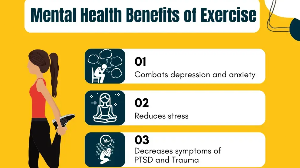

Access Your Health Information Anytime, Anywhere
+91 [Mobile Number] Change Number
Don’t worry, only you can see your personal data. No one will be able to see it.




Exercise for Mental Health: Beyond Physical Fitness
Exercise is not just about physical fitness; it's a powerful tool for enhancing mental well-being. Regular physical activity can have a profound impact on your mood, stress levels, and overall mental health. How Exercise Benefits Your Mental Health Reduces Stress:Exercise helps to release endorphins, which have mood-boosting and pain-relieving effects. Physical activity can also help to distract you from worries and negative thoughts, providing a mental break from daily stressors. Improves Mood: Exercise can have a positive impact on your mood and can even help to alleviate symptoms of mild to moderate depression and anxiety. It promotes feelings of well-being and can increase self-esteem. Enhances Cognitive Function: Regular exercise has been linked to improved cognitive function, including memory, attention, and focus. It can also help to sharpen your thinking and boost creativity. Promotes Better Sleep: Exercise can help to regulate your sleep patterns, leading to more restful and restorative sleep. Getting enough sleep is crucial for mental and emotional well-being. Increases Self-Esteem: Achieving fitness goals and seeing improvements in your physical health can boost your self-esteem and confidence. Exercise can also help you to feel more comfortable and confident in your body. Provides Social Connection: Participating in group exercise classes or team sports can provide opportunities for social interaction and connection, which can help to combat feelings of loneliness and isolation. Types of Exercise for Mental Health The great thing about exercise for mental health is that it doesn't have to be strenuous or complicated. Any type of physical activity that you enjoy can be beneficial. Here are some ideas: Walking: A simple walk in nature or around your neighborhood can do wonders for your mental state. Walking can be a great way to clear your head, de-stress, and enjoy the outdoors. Yoga: Yoga combines physical postures, breathing exercises, and meditation to promote relaxation and mindfulness. It can help to reduce stress, improve mood, and increase body awareness. Dancing: Dancing is a fun and expressive way to get your body moving and boost your mood. Put on some music and let loose! Swimming: Swimming is a low-impact exercise that's gentle on the joints and can be very relaxing. It's a great way to de-stress and clear your mind. Cycling: Whether you prefer a leisurely bike ride or a more intense cycling workout, getting on your bike can be a great way to improve your mood and reduce stress. Team Sports: Joining a sports team can provide a sense of community and belonging, while also giving you a good workout. * **Gardening:** Gardening is a gentle form of exercise that can be very therapeutic. It allows you to connect with nature and can be a great way to relieve stress. Getting Started If you're new to exercise, start slowly and gradually increase the intensity and duration of your workouts. It's important to find activities that you enjoy and that fit into your lifestyle. Here are some tips for getting started: Set realistic goals:Don't try to do too much too soon. Start with small, achievable goals and gradually work your way up. Find an accountability partner:Exercising with a friend or family member can help you to stay motivated and on track. Make it a habit:Schedule your workouts in your calendar and treat them like any other important appointment. Don't give up: There will be days when you don't feel like exercising. But try to stick with it and remember the benefits that exercise can have on your mental health. Important Note: If you are struggling with a mental health condition, it's important to talk to your doctor or a mental health professional. Exercise can be a helpful tool for managing symptoms, but it's not a substitute for professional treatment.